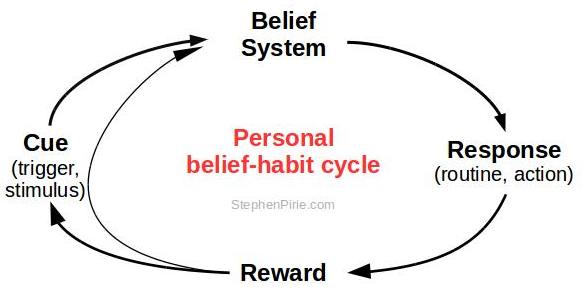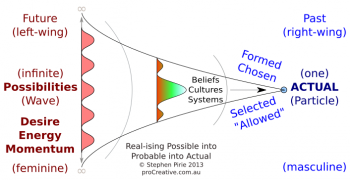"The mind is everything. What we think we become." [Buddha]
Paraphrasing the above within the context of belief-systems,
"Your belief-system is everything. What you think and believe, you become."
Your belief-system is what causes you to think and feel the way you do. Your belief-system will determine whether you're depressed, happy, sad, excited, or bored.
Your belief-system determines your courage, fears and behaviours.
As Jane Roberts (Seth) wrote:
Your sense of joy, sorrow, health or illness — all of these are also caused by your beliefs.1
And, contrary to what many, or the great majority believe, it is our belief-system that controls our autonomous bodily processes. As Roberts (Seth) put it,
The conscious mind directs the so-called involuntary systems of the body, and not the other way around. No idea slips insidiously past your awareness to affect your involuntary system unless it fits in with your own conscious beliefs. Once more, you will not be sick if you think you are well — but there may be other ideas that make you believe in the necessity for poor health.
A man believing he has heart trouble will finally, through his own anxiety, affect the functioning of his “involuntary” system until his heart is definitely harmed if the belief goes unchecked.2
You only need to examine your life to see your belief-system at work, as reflected in your level of success, your health, wellbeing and the quality of your relationships.
Your belief-system is your "auto-pilot" — the beliefs you hold and the "facts" you automatically take for granted. Your auto-pilot makes you do what you do, and is the root source of all the wonderful things in your life: the loves, the fun, the money and the pleasant surprises, as well as all the drama, conflict, frustration, stress and other negative situations.
An unknown author wrote (the following is, I believe, incorrectly attributed to Viktor Frankl):
"Between stimulus and response there is a space. In that space is our power to choose our response."
In other words, between something happening to us, and our reaction to that event, comment or action, we pass, albeit often quickly and without much awareness, through our belief-system.3,4,5

Understanding and learning to "catch ourselves" when responding in habitual ways is a key to change. We learn that we are not victims to emotions, and that we cannot justifiably blame drugs, alcohol or other factors such as culture or peer groups, for our behaviours. Most importantly we learn we are not "victims" to some difficult-to-reach subconscious — it's all available to us consciously if we remember to catch ourselves responding habitually, particularly those responses and emotions that we fear, or wish to avoid.6,7,8
How can a belief-system affect my health?
For around 30 years research has consistently shown that your beliefs are the primary determinant of health, more so than diet, exercise, genes etc. As Dr Herbert Benson affirms "We now have scientific proof that the mind (beliefs) can heal the body. This means that you have the innate ability to self-heal diseases, prevent life-threatening conditions, and supplement established drug and surgical procedures with mind body techniques that can improve your physiology, biochemistry, brain functioning, and genetic activity."9
Our belief-systems are central to how we approach food, diet, nutrition, exercise, sleep, stress, rest and play. Even the idea itself, that beliefs can improve one's health can be immensely reassuring to, and beneficial for those afflicted with illness. Conversely, "a study of more than 7,000 people over 12 years found that those with health anxiety at the start of the study were about 70% more likely to develop heart disease than those without that state of mind. Additionally, the researchers found that the higher the reported anxiety, the higher the risk of heart disease."10
Of the 9 factors found to be common to those who recovered from "terminal" (untreatable) cancer, 7 of those 9 factors are belief-system based.
How can it/they change my health?
Having a solid belief and conviction in health (not just wishful-thinking), will drive you to do those things that will lead to better health (or in some cases when fears, depression and negative thoughts dominate, your belief-system will generate ill-health).
How do I change my belief-system?
Changing your belief-system is first and foremost driven by your desire to change. That is the first step.
It is not for naught that for thousands of years we've been advised that desire and belief are necessary to getting "what things soever ye desire".11
Is a belief-system my thoughts?
Yes, as well as your deep-seated emotions, your likes, dislikes, opinions, fears and so on.
Even what you smell is driven by your belief-system. It has been demonstrated countless times that people, when hypnotised, can believe an onion tastes and smells like an apple, and can eat that onion, as if it were an apple.
How do I stop unpleasant thoughts?
Great question. "Unpleasant thoughts" are usually due to two factors: fear of our personal safety, wellbeing, health and financial situation, and our fear or belief that we're not as good, moral, strong, virtuous, rich or as beautiful as our partner, family, friends and the wider community wants or expects us to be.
In other words, unpleasant thoughts are usually our fear that we'll let ourselves down (fail), let others down (and possibly "hurt them"), or be scorned for not fitting current societal norms and expectations.
Recent research has indicated that instead of being "soft-wired" (genetically structured)12 to be competitive13 we're actually soft-wired to belong — to feel we're a valued and loved member of a relationship, a family, group or community.
So the first step to "stop" unpleasant thoughts is to talk to those who you think you're disappointing or you will let down. Generally they'll ease your fears, and so that fear disappears. Or talk to a confidant who'll remain non-judgemental, and by doing so, ease you back into feeling that you belong.
Ultimately, we're all in this together, so everyone has a vested interest in helping you be a valued and loved member in your relationships with partners, family, groups, work and community.
Some "unpleasant thoughts" such as shame and guilt can be due to others having small-minded beliefs, fears or expectations about you. In that case, their negative thoughts towards you reveals they're more in need of help and understanding than yourself. Knowing this can greatly relieve "unpleasant thoughts" when due to disapproval by others — as their disapproval often speaks more about them, than you.
In my book "The Dynamics of Gender and Life" a broader and deeper perspective is detailed, on the immaturity of present human cultures — and that those who are spiteful, vengeful and aggressive are reflecting our cultural immaturity, writ small. Overall, it would appear that culturally, Western democracies are in early to mid developmental phase 4 (early adulthood), along with remnants of late developmental phase 3 (adolescence) with its emphasis on individualism, competition, technology, religious and scientific fundamentalism14
How do I start thinking the right way?
It's preferable to think in a way that brings you what you want, and is right for you. The first step in that process is to imagine what you want. Then there are a number of steps to take in bringing those desires into reality.
What tools or techniques can I use to change my thinking?
As mentioned in the previous question, start with imagining what you want. And then start taking action in line with those desires. Be alert to "downward causation" — societal expectations in the form of those who will actively work to keep you where you are (in order for them to remain comfortable, profitable, in control etc). "Downward Causation" is an active process in our lives, squeezing unlimited possibilities into fewer probabilities from which we choose our reality. An example provided in the book "The Dynamics of Gender and Life" is that of the possibility of walking around naked in your local mall, but the probability of doing so is very low, due to the "downward causative" influence of the community, in the form of disgust, fear, anger, police arrest, etc.
Excerpt (The Dynamics of Gender and Life):
We live within various systems, collectives and interactions that cocoon and guide us.
That squeezing, or guidance by the environment, or in the case of the naked-in-the-mall example, the community, is often termed ‘downward causation’. In physics, downward causation is when a ‘higher-order’ system (e.g. community) constrains the parts (lower-order system, e.g. individuals).
In respect of this book, I prefer ‘inward causation'15 in that we are constrained by those ‘out there’, around us, not above us. In the naked-in-the-mall example, it is those around us, within the community—police, outraged folk—who will constrain us, arrest us, or similar. They dictate (to a large degree) our behaviours, as shown in 'Figure 10: Inward causation'.
Is this all about law of Attraction?
In part, but we go further and include the Law of Action: you need to initiate, reach out and create, as well as attract others and "the universe" to come to you. Our workshops and forums focus on the machinery of the relationships you have that are constraining or disallowing you to achieve more (health and wellbeing). Another aspect is the deeper understanding of our relationship with time (past and future) - more explained in Stephen's ebook "Simple Tools for Clarity, Understanding and Betterment."
Am I locked in to what I think?
Only to the extent that you allow habits to dictate what you do and experience. As mentioned earlier, change begins with imagining what you want, then taking physical action in line with that new “you”.
More details on how our belief-systems affect our lives is revealed in the book "The Dynamics of Gender and Life: Timeless Principles of Quantum, Fractal and Natural Phenomena, and Human Social Dynamics."
- The Dynamics of Gender and Life -- INDEX
- The Dynamics of Gender and Life -- Table of Contents
- The Dynamics of Gender and Life -- REVIEWS
BUY "The Dynamics of Gender and Life: Timeless Principles of Quantum, Fractal and Natural Phenomena, and Human Social Dynamics (for Australian and International Deliveries)
- 1. Roberts, Jane (2011-09-30). The Nature of Personal Reality: Specific, Practical Techniques for Solving Everyday Problems and Enriching the Life You Know (A Seth Book). Amber-Allen Publishing.
- 2. Roberts, Jane (2011-09-30). The Nature of Personal Reality: Specific, Practical Techniques for Solving Everyday Problems and Enriching the Life You Know (A Seth Book). Amber-Allen Publishing.
- 3. Put differently, your belief-system is the "mechanism" that "collapses"/solidifies/congeals/allows (infinite) possibility into lived, or experienced reality. It converts possibility into actuality. A very simple example: pick a number. Which number did you pick? 7? You could choose any number from within the infinite range of numbers. That's collapsing possibility (infinite range of numbers) to one, actual number.
- 4. There are some who believe we can live without a belief-system - that's a belief, and one that will, by necessity, still be central to the process of "collapsing" or selecting from unlimited possibilities, one experienced physical or psychic reality.
- 5.
 As is covered in more detail in "Simple Tools for Clarity, Understanding and Betterment", infinite possibilities are "squeezed" into probable choices, then into one-at-a-time, sequential-time experiences, be they physical and/or psychic/dream states. See figure right (from the Simple Tools book):
As is covered in more detail in "Simple Tools for Clarity, Understanding and Betterment", infinite possibilities are "squeezed" into probable choices, then into one-at-a-time, sequential-time experiences, be they physical and/or psychic/dream states. See figure right (from the Simple Tools book): - 6. The means by which we may more thoroughly and effectively catch ourselves responding habitually, will be covered in detail in a forthcoming online educational course.
- 7. See also "The danger in being offended"
- 8. This awareness is particularly beneficial to those who fear various 'triggers' that habitually initiate unpleasant memories.
- 9. Dr Herbert Benson, The Relaxation Revolution
- 10. Health anxiety may increase risk of heart disease, research finds"
- 11. Examples include the affirmation that "what things soever ye desire, when ye (visualise, meditate, pray) ... believe that ye receive them, and ye shall have them" [Bible, Mark: 11.24], and "Whether you think (believe) you can, or think (believe) you can't, you're right" [Henry Ford], plus others abound.
- 12. "soft-wired" insofar as our genetic structures and how they're expressed are "malleable" in response to our beliefs, as revealed by the science of epigenetics. See also physioplasticity.
- 13. Darwinian "survival of the fittest" theories were "naturally selected" during the mechanical, competitive, Newtonian era. Fortunately the relatively new science of quantum physics has unquestionably and undeniably confirmed that "immediate, unmediated connections ... underlie all the events of everyday life." [Physicist, Nick Herbert] There's an intuitive interconnectedness pervading all of our lives: we're more "plugged in" than standard Western science has hitherto discovered. All of which means, "nothing is unannounced. If we're paying attention stuff comes down the pike" [Terence McKenna]". It's a cooperative universe, at root. Competitive, hierarchical behaviours are what children and teenages do, to help establish their individuality.
- 14. Fundamentalism is 'either-or' thinking rooted in perfectionism — i.e. there's only one way that is right, contrary to life's infinite, endless fields of possibility and growth. Fundamentalism is characteristic of the "childhood of our species". Note the correlation of deeply fundamentalist people with those who are severe and punishing — they typically lack a sense of humour, and often openly disallow dancing, singing, frivolity, education and creativity. This also applies to scientists, atheists and sceptics, who are scathing of 'esoteric' matters despite the ample evidence of quantum physics for multi-dimensional, super/meta-physical aspects to everyday life. See Update 18 December, 2015 - WOW for an explanation of why such folk are often so vociferously scathing of such matters.
- 15. In my book a lateral ‘Inward causation’ is used synonymously with the hierarchical ‘downward causation’ (as in down from above, from ‘higher authority’)
